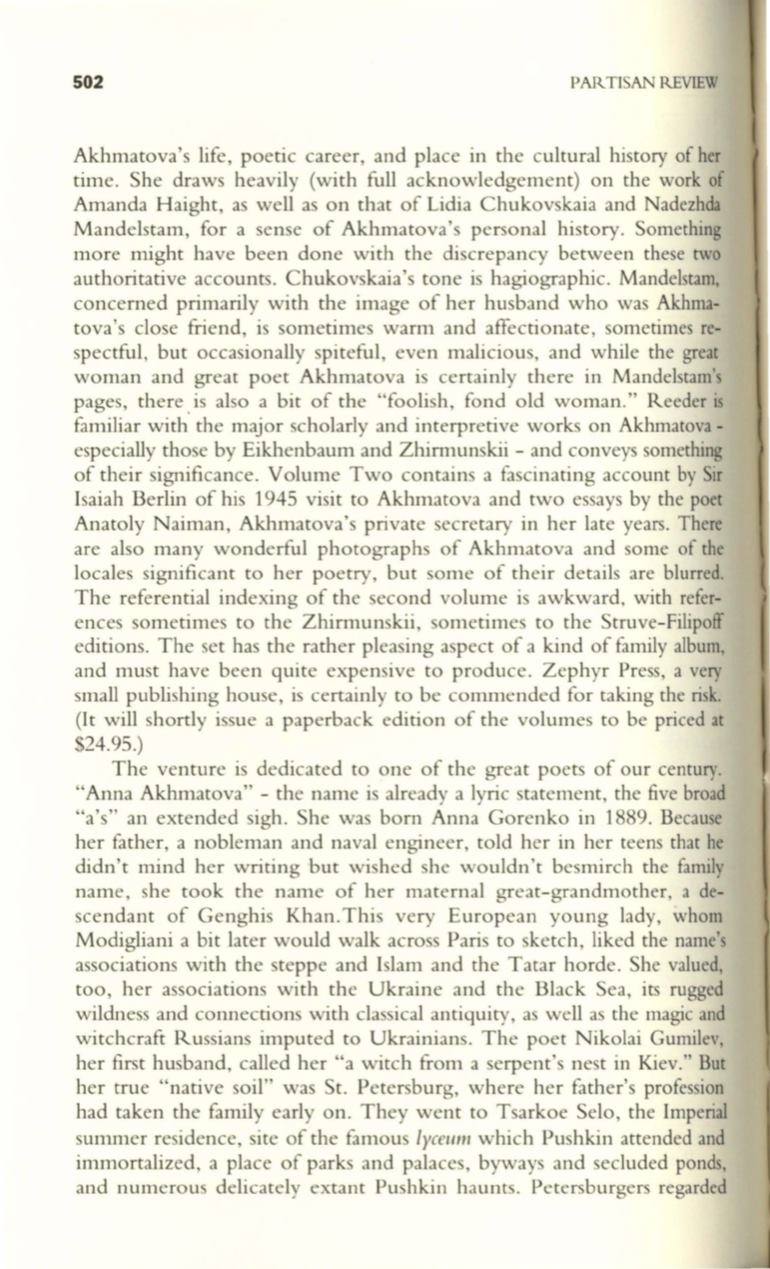
502
PARTISAN REVIEW
Akhmatova's life, poetic career, and place in the cultural history of her
time. She draws heavily (with full acknowledgement) on the work of
Amanda Haight, as well as on that of Lidia Chukovskaia and Nadezhda
Mandelstam, for a sense of Akhmatova's personal history. Something
more might have been done with the discrepancy between these two
authoritative accounts. Chukovskaia's tone is hagiographic. Mandelstam,
concerned primarily with the image of her husband who was Akhma–
tova's close friend, is sometimes warm and affectionate, sometimes re–
spectful, but occasionally spiteful, even malicious, and while the great
woman and great poet Akhmatova is certainly there in Mandelstam's
pages, there .is also a bit of the "foolish, fond old woman." Reeder is
familiar with the major scholarly and interpretive works on Akhmatova -
especially those by Eikhenbaum and Zhirmunskii - and conveys something
of their significance. Volume Two contains a fascinating account by Sir
Isaiah Berlin of his 1945 visit to Akhmatova and two essays by the poet
Anatoly Naiman, Akhmatova's private secretary in her late years. There
are also many wonderful photographs of Akhmatova and some of the
locales significant to her poetry, but some of their details are blurred.
The referential indexing of the second volume is awkward, with refer–
ences sometimes to the Zhirmunskii, sometimes to the Struve- Filipotf
editions. The set has the rather pleasing aspect of a kind of family album,
and must have been quite expensive to produce . Zephyr Press, a very
small publishing house, is certainly to be commended for taking the risk.
(It will shortly issue a paperback edition of the volumes to be priced at
$24.95.)
The venture is dedicated to one of the great poets of our century.
"Anna Akhmatova" - the name is already a lyric statement, the five broad
"a's" an extended sigh. She was born Anna Gorenko in 1889. Because
her father, a nobleman and naval engineer, told her in her teens that he
didn't mind her writing but wished she wouldn't besmirch the family
name, she took the name of her maternal great-grandmother, a de–
scendant of Genghis Khan .This very European young lady, whom
Modigliani a bit later would walk across Paris to sketch, liked the name's
associations with the steppe and Islam and the Tatar horde. She valued,
too, her associations with the Ukraine and the Black Sea, its rugged
wildness and connections with classical antiquity, as well as the magic and
witchcraft Russians imputed to Ukrainians. The poet Nikolai Gumilev,
her first husband, called her "a witch from a serpent's nest in Kiev." But
her true "native soil" was St. Petersburg, where her father's profession
had taken the family early on. They went to Tsarkoe Selo, the Imperial
summer residence, site of the famous
lycel/III
which Pushkin attended and
immortalized, a place of parks and palaces, byways and secluded ponds,
and numerous delicately extant Pushkin haunts. Petersburgers regarded


